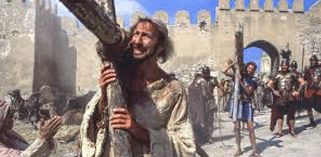Editor’s Note: This is an essay I originally wrote for an undergrad history class on religion, way back in 2006.
In the 1979 film Life of Brian, the Monty Python sketch comedy team interpreted Christian history, as presented in the Gospels of the New Testament, through the lens of a modern skeptic’s eye. Through this method, they demonstrate the difficulty in discerning universal truths from personal experiences.
The film begins, as does the Gospel of Matthew, with wise men following a star to the new baby, the messiah. But in the Monty Python version, they follow the star to the wrong place, and worship a false messiah – Brian. Within the first few moments, the wisest of men have already been led astray in their search for religious truth, and this theme is carried through the entire film, and thereafter we see the events in the life of Jesus lived in parallel by Brian.
In his essay, “Why I Am Not A Christian”, Bertrand Russell takes aim at the historical character of Jesus, and argues that Christians assume that Jesus was the “best and wisest of men” (p.14) without actually following the doctrines of His wisdom. Russell mentions several doctrines of Jesus, including “Judge not lest ye be judged”, of which he says that “that principle I do not think you would find was popular in the law courts of Christian countries”.
In an early scene in Life of Brian, a large group of women have disguised themselves as men in order to take part in the stoning of a blasphemer, an elderly man who simply said that his wife’s cooking was “good enough for Jehovah”. The mob eventually stones the Roman officiate for blasphemy when he himself says the word Jehovah.
Later, after Brian accidentally causes an elderly man to break his vow of silence, the man attempts to strangle him, and claims Brian is not the Messiah. Brian’s followers quickly shout, “A nonbeliever! Persecute! Kill the heretic!” Even the introduction of the messiah is not enough to prevent the people from judging one another. Russell says, “All these, I think, are good maxims, although they are a little difficult to live up to. I do not profess to live up to them myself; but then, after all, it is not quite the same thing as for a Christian”.
Monty Python depict the people of Christ’s era as splintered factions of anger: the People’s Front of Judea and the Judean People’s Front are both opposed to Roman rule, yet each also despises the other. They comment on all the wonderful things the Romans have provided for them (sanitation, public order, roads, et cetera), while conspiring against both the Holy Roman Empire and each other. Brian attempts to unite them against Rome (“We mustn’t fight each other! Surely, we should be uniting against the common enemy!”), only to have his words inspire two factions to fight against a third.
It is exceedingly difficult to distill truth from fiction from the Biblical stories of Jesus. Similarly, in Life of Brian, a crowd of people in a marketplace assume Brian is the messiah, and chase him. As he runs away, he drops a gourd, and then shortly after abandons a sandal that falls off his foot. His followers collect both items, but each among them has his own interpretation of the symbolism of the things their messiah cast aside. One believes the shoe is a sign that they should collect shoes in great numbers, while another believes that the message is to “cast off the shoes, follow the gourd”.
Here are discrepancies in the symbolic interpretation of a particular event, in the immediate aftermath of the event, by the very people who personally witnessed the event. If each of these people wrote their own interpretation, these become a foundation for future interpretation, in much the same way as the Gospels of Mark, Matthew, Luke, and John. If those immediately present to witness an event cannot agree on the meaning of what they saw, how then can it be possible to find any qualitative meaning in that same event two thousand years later? There are discrepancies between the various Gospels, and yet they are all put forth and defended as the word of God: truth. But if there are differences, then they cannot all be true in a universal sense, merely true to the writer who experienced them in that particular way.
In the absence of corroborating and unbiased accounts or historical evidence, the universal truthfulness of any personal truth cannot be ascertained. Some argue that the Gospels corroborate one another, and yet they are certainly not unbiased. The early church chose certain gospels for inclusion into the Holy Canon and abandoned others. Perhaps some of the abandoned testimonials became so because they contradicted, or even invalidated, those particular truths to which the early church leaders clung. An incomplete history is certainly no place from which to draw universal truth.



